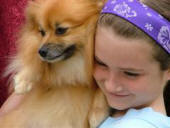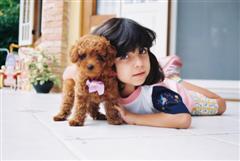|
|
Dog Behavior Library
|

Dog
Aggression Toward Children
Preventing Dog Bites
-
Realistically
evaluate environment and lifestyle
and consult with a professional
(e.g., veterinarian animal
behaviorist, responsible breeder)
to determine suitable breeds,
of dogs for consideration.

-
Dogs with histories of aggression
are inappropriate in households
with children.
-
Be sensitive to cues that
a child is fearful or apprehensive
about a dog and, if so, delay
acquiring a dog.
-
Spend time with a dog before
buying or adopting it. Use
caution when bringing a dog
or puppy in the home of an
infant or toddler.
-
Spay/neuter virtually all
dogs (this frequently reduces
aggressive tendencies).
-
Never leave infants or young
children alone with any dog.
-
Properly socialize and train
any dog entering the household.
Teach the dog
appropriate behavior
(e.g., rolling over to expose
abdomen and relinquishing
food without growling).
-
Immediately seek professional
advice (e.g., from veterinarians,
animal behaviorists, or responsible
breeders) if the dog develops
aggressive or undesirable
behaviors.
-
Do not play aggressive games
with your dog (e.g., wrestling).
|
Teach
children basic safety around
dogs and review regularly: |

- Never approach an unfamiliar
dog.
- Never run from a dog and
scream.
- Remain motionless when approached
by an unfamiliar dog
(e.g., "be still like
a tree).
- If knocked over by a dog,
roll into a ball and lie still
(e.g., "be still like
a log")
- Never play with a dog unless
supervised by an adult.
- Immediately report stray
dogs or dogs displaying unusual
behavior to an adult.
- Avoid direct eye contact
with a dog.
- Do not disturb a dog who
is sleeping, eating, or caring
for puppies.
- Do not pet a dog without
allowing it to see and sniff
you first.
- If bitten, immediately report
the bite to an adult.
|
|
|